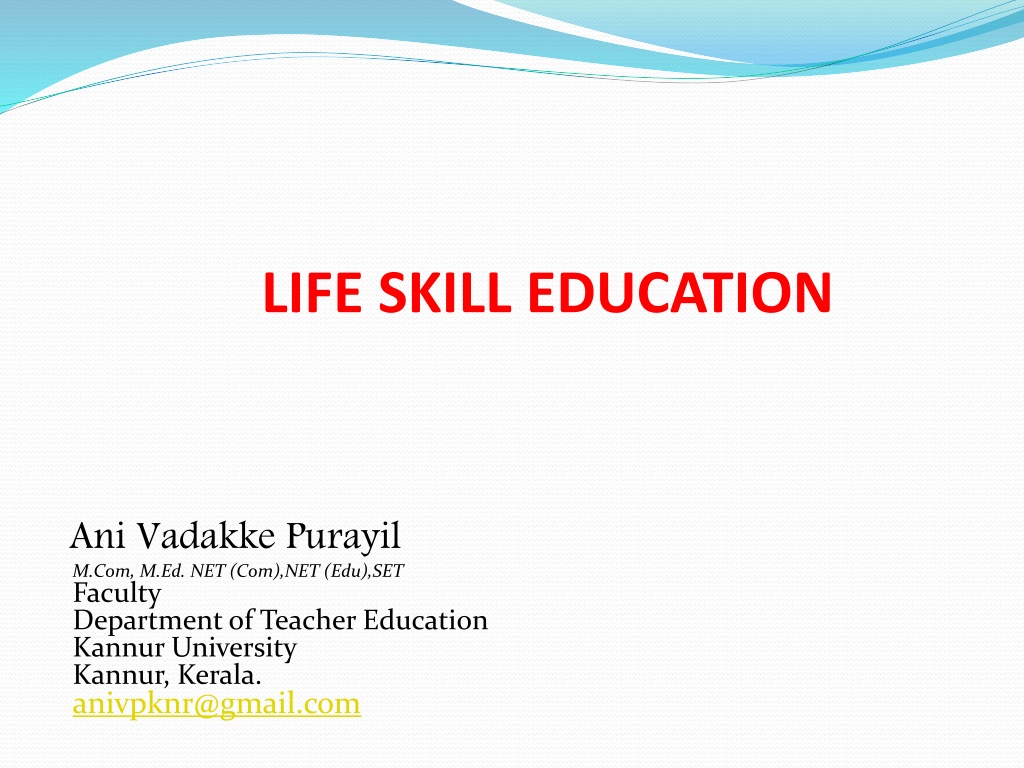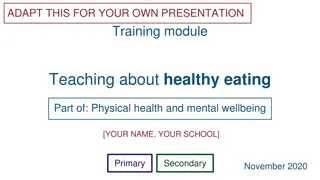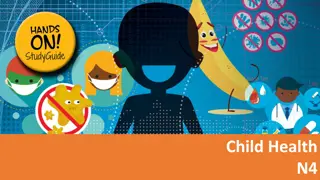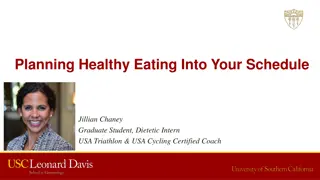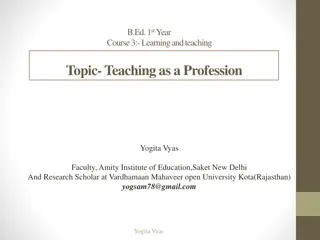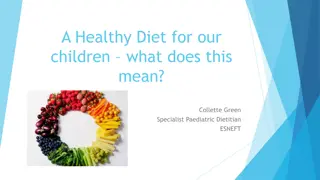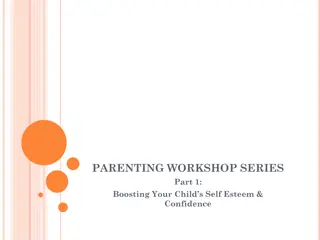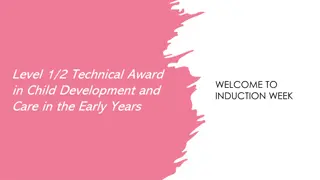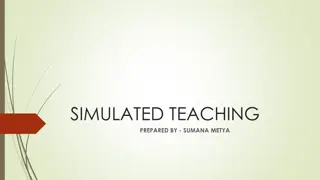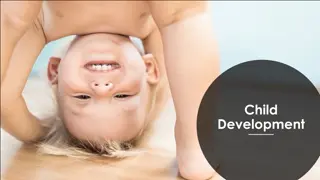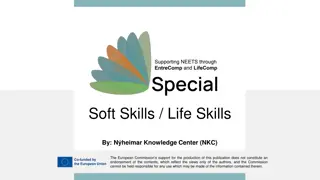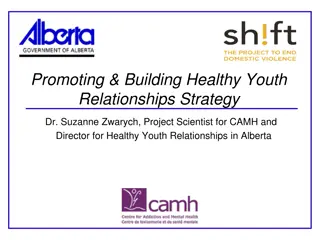Importance of Teaching Life Skills for Healthy Child Development
Life skills education plays a crucial role in promoting healthy child and adolescent development by enhancing adaptive behavior, problem-solving abilities, and social skills. It encompasses three core areas: thinking skills, social skills, and emotional skills. Teaching life skills is essential for preparing young individuals to cope with challenges, make informed decisions, and foster positive relationships. Global organizations like UNICEF, UNESCO, and WHO emphasize ten core life skills, including self-awareness, critical thinking, and effective communication. By integrating life skills education, we can facilitate lifelong learning, socialization, and overall well-being.
Download Presentation

Please find below an Image/Link to download the presentation.
The content on the website is provided AS IS for your information and personal use only. It may not be sold, licensed, or shared on other websites without obtaining consent from the author. Download presentation by click this link. If you encounter any issues during the download, it is possible that the publisher has removed the file from their server.
E N D
Presentation Transcript
LIFE SKILL EDUCATION Ani Vadakke Purayil M.Com, M.Ed. NET (Com),NET (Edu),SET Faculty Department of Teacher Education Kannur University Kannur, Kerala. anivpknr@gmail.com
LIFE SKILL EDUCATION World Health Organization (WHO) defined Life Skills as "the abilities for adaptive and positive behaviour that enable individuals to deal effectively with the demands and challenges of everyday . LIFE SKILL EDUCATION According to UNICEF, Life Skills is a behavior change or behavior development approach designed to address balance of three areas: Knowledge Attitude Skills.
Life skill has been classified into three broad categories: Thinking skills: Thinking skills are the skill that enhances the logical faculty of the brain using an analytical ability, thinking creatively and critically, and developing problem-solving skills and improving decision-making abilities. Social skills: Social skills include interpersonal skills, communication skills, leadership skills, management skills, advocacy skills, co-operation and team building skills, etc. Emotional skills: Emotional skills, involves, knowing and being comfortable with oneself. Thus, self management, including managing/coping with feelings, emotions, stress and resisting peer and family pressure.
Importance of teaching life skills The promotion of healthy child and adolescent development; Primary prevention of some key causes of child and adolescent death, disease and disability Socialization Preparing young people for changing social circumstances. Improve quality and efficiency of the education system The promotion of life long learning The promotion of peace
The world bodies such as UNICEF, UNESCO, and WHO list the ten core Life Skills as: 1. Self-awareness 2. Critical thinking 3. Creative thinking 4. Decision making 5. Problem Solving 6. Effective communication 7. Interpersonal relationship 8. Empathy 9. Coping with stress 10. Coping with emotion
Self-awareness includes recognition of self, our character, our strengths and weaknesses, desires and dislikes. Developing self-awareness can help us to recognize when we are stressed or feel under pressure. It is often a prerequisite to effective communication relations, as well as for developing empathy with others. Critical thinking is an ability to analyze information and experiences in an objective manner. Critical thinking can contribute to health by helping us to recognize and assess the factors that influence attitudes and behaviour, such as values, peer pressure and the media. and interpersonal
Creative thinking is a novel way of seeing or doing things that is characteristic of four components fluency (generating new ideas), flexibility (shifting perspective easily), originality (conceiving of something new), and elaboration (building on other ideas). Decision making helps us to deal constructively with decisions about our lives. This can have consequences for health. It can teach people how to actively make decisions about their actions in relation to healthy assessment of different options and, what effects these different decisions are likely to have.
Problem constructively with problems in our lives. Significant problems that are left unresolved can cause mental stress and give rise to accompanying physical strain. Interpersonal relationship skills help us to relate in positive ways with the people we interact with. This may mean being able to make and keep friendly relationships, which can be of great importance to our mental and social well-being. It may mean keeping, good relations with family members, which are an important source of social support. solving helps us to deal
Empathy - To have a successful relationship with our loved ones and society at large, we need to understand and care about other peoples needs, desires and feelings. Empathy is the ability to imagine what life is like for another person. Without empathy, our communication with others will amount to one-way traffic. Empathy can help us to accept others, who may be very different from ourselves. Effective communication means that we are able to express ourselves, both verbally and non- verbally, in ways that are appropriate to our cultures and situations. This means being able to express opinions and desires, and also needs and fears. And it may mean being able to ask for advice and help in a time of need.
Coping with stress means recognizing the sources of stress in our lives, recognizing how this affects us, and acting in ways that help us control our levels of stress, by changing our environment or lifestyle and learning how to relax. Coping with emotions means involving recognizing emotions within us and others, being aware of how emotions influence behaviour and being able to respond to emotions appropriately. Intense emotions like anger or sadness can have negative effects on our health if we do not respond appropriately
Different activities that can be used to enhance Life Skills in Students are as follows: Classroom Discussions: An activity, providing opportunities for students to learn and practice turning to one another in solving problems. Enables students to deepen their understanding of the topic and personalize their connection to it. Brainstorming: It allows students to generate ideas quickly and spontaneously. Helps students use their imagination and think out of the box. Good discussion starter because the class can creatively generate ideas. It is essential to evaluate the pros and cons of each idea or rank ideas according to certain criteria.
Role Plays: Along with being a fun activity and involves whole class, to be active and participative, it also provides an excellent strategy for practicing skills; experiencing how one might handle a potential situation in real life; increasing empathy for others and their point of view; and increasing insight into own feelings. Groups: Groups are helpful when the time is limited as it maximizes student input. Allows students interactions, allows to, know, one another better which in a way enhances team building and team work.
Educational Games and Simulations: It promotes fun, active learning, and rich discussion as participants work hard to prove their points or earn points. They require the combined use of knowledge, attitudes, and skills and allow students to test out assumptions and abilities in a relatively safe environment. Analysis of Situation and Case Studies: It gives a chance, to analyze, explore, challenges, dilemmas and safely test solutions for; providing opportunities for working together in groups, sharing idea, new learning and gives insight and promotes sometimes to see things differently. Case studies are like powerful catalysts for thought and discussion. Engaging in this thinking process; students improve their own, critical thinking, decision-making skills. It also gives chance to confront with risks or any challenges and find ways to cope with it.
Story-Telling: Can help students think about local problems and develop critical thinking skills, creative skills to write stories, or interact to tell stories. Story-Telling lends itself to draw analogies or make comparisons, help discover healthy solutions. It also enhances attention, concentration, listening skills and develops patience and endurance. Debates: Provides opportunity to address a particular issue in depth and creatively. Health issues lend themselves well: students can debate, for instance, whether smoking should be ban in public places in a community. It allows students to defend a position that may mean a lot to them. It offers a chance to practice higher thinking skills.
References: https://files.eric.ed.gov/fulltext/EJ1126842.pdf https://cbse.nic.in/cce/life_skills_cce.pdf https://shodhganga.inflibnet.ac.in/bitstream/10603/24 0313/4/04_chapter%201.pdf https://www.researchgate.net/publication/311883141 _Significance_Of_Life_Skills_Education http://tumkuruniversity.ac.in/oc_pg/msw/MSW%20II% 20sem_Need_and_Importance_of_Life_Skill_educatio n_in_Institutional_and_Non-Institutional_Settings.pdf Prajapati, Ravindra. Sharma, Dharmendra (2017), Significance Of Life Skills Education ,Contemporary Issues in Education Research First Quarter 2017 Volume 10, Number 1. Jour10.19030/cier.v10i1.9875 Bosky. Sharma,
